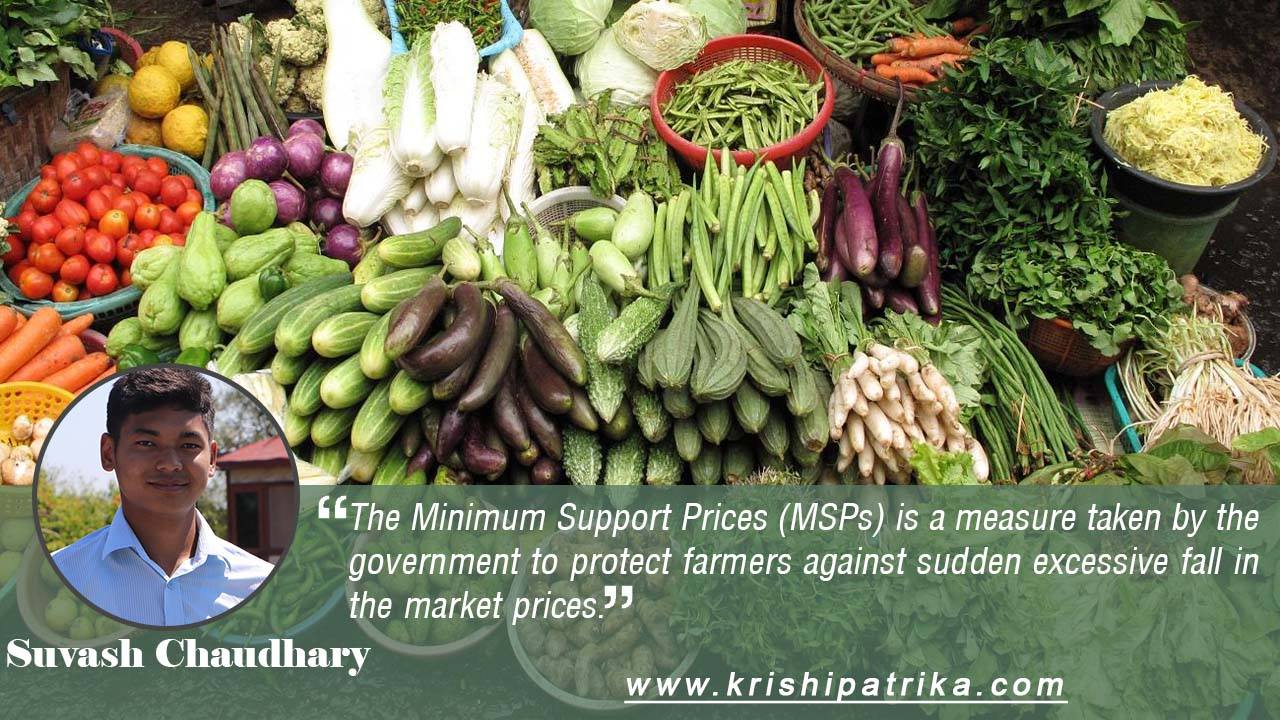
Although about 65% of the population are engaged in agricultural sector (agriculture, forestry and fisheries), the contribution of this sector to GDP is estimated to be 26.98% in the fiscal year 2018/19. This contribution was 27.59% in the fiscal year 2017/18. In the fiscal year 2019/20, Nepal spent Rs. 243 billion importing food which was an increase of Rs. 19 billion compared to the previous fiscal year. In the last fiscal year, Nepal imported rice worth Rs. 23.17 billion. Nepal imported rice of Rs. 11.06 billion just in the five months since the government imposed the first lock down due to COVID-19 pandemic.
Manpower needed for agricultural sector is being dragged out of the country. The foremost reason for such increased labor migration is because of reduction in rice fields, lower productivity and low farm gate prices. In such condition, Minimum Support Prices (MSPs) should be fixed by the government so that the farmers must get price for their field crops against excessive fall in price during huge production years. This measure is intended to encourage farmers to grow their desirable crops.
What Is Minimum Support Prices (MSPs) ?
The Minimum Support Prices (MSPs) is a measure taken by the government to protect farmers against sudden excessive fall in the market prices. It is what the government will buy the stock at this minimum guaranteed prices, if no one else buys it.
How Did Minimum Support Prices (MSPs) Policy Come Into Place ?
It was early 1960s, when India was facing excessive shortage of cereals and it was once Nepal exports rice in India during 1970s. New agricultural policies were initiated to start the Green Revolution. India adopted MSPs as a price support mechanism to induce farmers to adopt the new technology of HYVs seeds for maximizing productions and ensure the rational utilization of land and other resources. The market price for most of the period operated in around the MSPs. Thus, the price policy was successful for most cereals in India. Recently, the Indian government set prices for 23 different food and non-food crops.
Minimum Support Prices (MSPs) Policy In Nepal :
Government introduced Minimum Support Prices (MSPs) for major agriculture products in the seventh plan, however it was not found effective. In 1976/77 and in the following years the farm gate prices of paddy have been higher than the production costs in Eastern, Central and Far Western Nepal. But the MSPs had not been found effective to provide this level of farm gate prices. The MSPs Policy was abandoned in 1997/98, because the profit margin received by the farmers on paddy was found lower than it is at present. After 1998/99, price of food and agricultural commodities are determined solely by the market mecganism. In Nepal from 1957 to 1981 the major objectives of the price policy was to stabilize the consumer prize and net on production. The support prices were meant for increasing the production only since 1981.
In 2012, under the directives of Prime Minister, Baburam Bhattarai the government initiated steps to revive the price policy. The MSPs would be recommended by the Ministry Of Agriculture Development (MOAD) and procured by Nepal Food Corporation (NFC). But on October 2016, there was no movement on the plan and the talks were on the table while the execution was getting delayed.
A cabinet meeting which was held on Tuesday June 2020 fixed the MSPs of paddy in the beginning of the plantation season, said by Dr. Hari Bahadur KC spokeman at the Ministry Of Agriculture and Livestock Development under the directive of honorable Minister Ghana Shyam Bhusal. According to him, the MSPs for coarse paddy has been fixed at Rs. 2735/- per quintal. Similarly, the support prices for medium quality paddy is fixed at Rs. 2885/- per quintal. Although, MSPs is fixed by the government, yet farmers do not get their price in time. The MSPs provided to selected agricultural commodity has not been effective mainly due to the government’s inability to intervene in the market with limited financial resources and organizational capacity.
Failure In Making Price Policy In Nepal :
Generally, MSPs should be declared before the cropping season to encourage farmers to grow their sslected crops. But interestingly in Nepal, it is declared after the harvest with exception in some years due to which farmers are forced to sell at low prices. Lack of clear vision and direction, weak infrastructures especially storage and public distribution system and poor coordination was responsible for failure of price policy in Nepal which is even much difficult to handle due to open border with India.
Another reason for failure of price policy in Nepal is the establishment of many institutions in the process. In order to determine MSPs, three Ministries and provision of cabinet are involved. Due to lack of coordination amongst Ministries and Ministry’s own bureaucratic procedures creates big problems in price declaration.
Recommendation And Conclusion :
The objectives of the price policy should ensure increased production and profitability of the farmers and also taking account of the consumer price. During the price determination and implementation of the schemes coordination amongst Ministries be good as involvement of many authorities creates confusion and time taking. MSPs should be implemented for major cereal crops, pulse crops and oilseeds. The Food Management and Trading Company Limited should be made responsible for implementing the support price. The infrastructures like storage house, drying floors, mills and selling outlets should be steenghened. Similarly, Ministry of Agriculture and Livestock Development should be responsible for determining the MSPs and sending proposals to cabinet for approval. A separate commission for cost and price determination of agriculture commodities can be formed to recommend to the government.
Thus, there is a great need in agricultural revolution. As price policy is successful in most cereal crops in India, we have to learn from experience of India. MSPs has potential to support Nepalese agriculture and farmers miserable conditiin. But before these, it is necessary to solve domestic problems.









